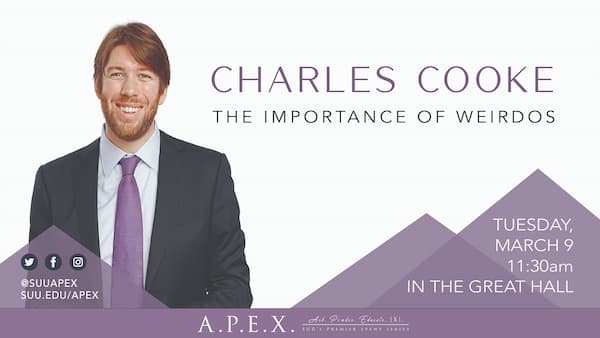
Charles C. W. Cooke is the editor of National Review Online, and the author of The Conservatarian Manifesto. Charles is a graduate of the University of Oxford, at which he studied modern history and politics. His work has focused on Anglo-American history, British liberty, free speech, the Second Amendment, and American exceptionalism. Charles is also a co-host of the Mad Dogs and Englishmen podcast. He immigrated to the United States in 2011 and became an American citizen in 2018. Charles has been broadcast for various programs such as the BBC, MSNBC, Fox News, and Fox Business. He has also authored pieces for large-scale news sources such as the Los Angeles Times, the New York Times, and the Washington Post.
Reflection
A.P.E.X. Events, alongside the SUU School of Business, was pleased to host author and editor Charles Cooke to the campus to give his lecture on “The Importance of Weirdos!” Cooke is a graduate of the University of Oxford, at which he studied modern history and politics. His work has focused on Anglo-American history, British liberty, free speech, the Second Amendment, and American exceptionalism. He is also a co-host of the Mad Dogs and Englishmen podcast. He immigrated to the United States in 2011 and became an American citizen in 2018. Charles has been broadcast for various programs such as the BBC, MSNBC, Fox News, and Fox Business. He has also authored pieces for large-scale news. He was introduced to the stage by SUU Associate Professor of Marketing and Director of Entrepreneurship, Tyler Stillman.
Cooke began his lecture briefly mentioning his previous visit to SUU back in 2019, and his discussion on the abundance of “weird products.” He mentioned that many of the products people use everyday in the modern world, from drive-thru donut shops to Teenage Mutant Ninja Turtles, wouldn’t exist without a creatively-thinking person, or “weirdo” as Cooke calls them, coming up with the idea. He continued on, talking about the crucial importance and necessity of weirdos in the economy, science, culture, etc., and how such people are increasingly being discouraged from being creative, bringing up the examples of Disney’s firing of The Mandalorian star, Gina Carano, and a New York Times science writer for openly sharing political and personal views that the respective companies don’t agree with.
After his short discussion, Cooke was joined onstage by Dr. Lynn Vartan for a Q&A session which the audience, where they further discussed the controversial firing of Gina Carano and the cancel culture prevalent in today’s society and disagreement between peers as well as arguing for a point and how it impacts one’s professional and even personal life.
by Emily Sexton











